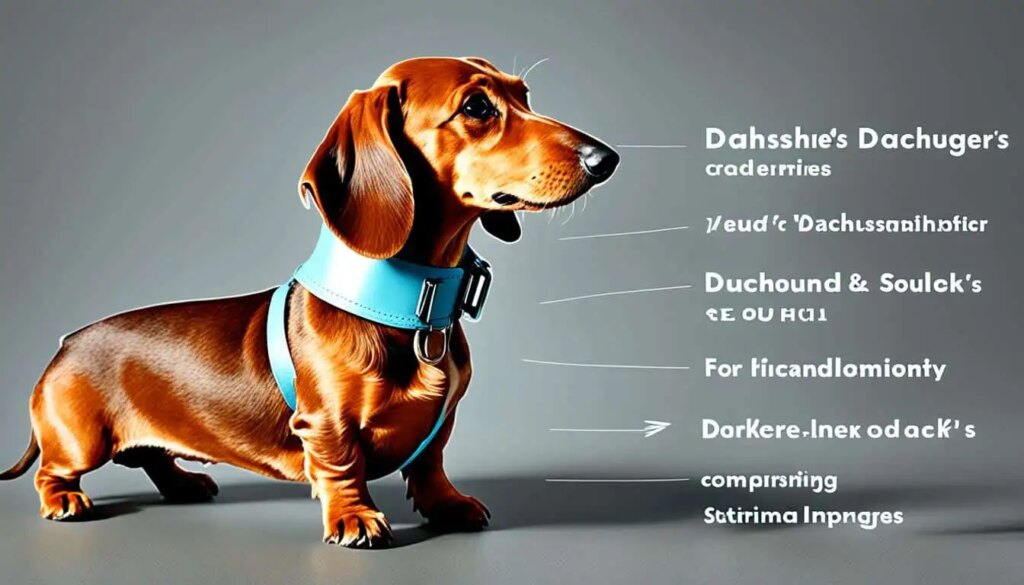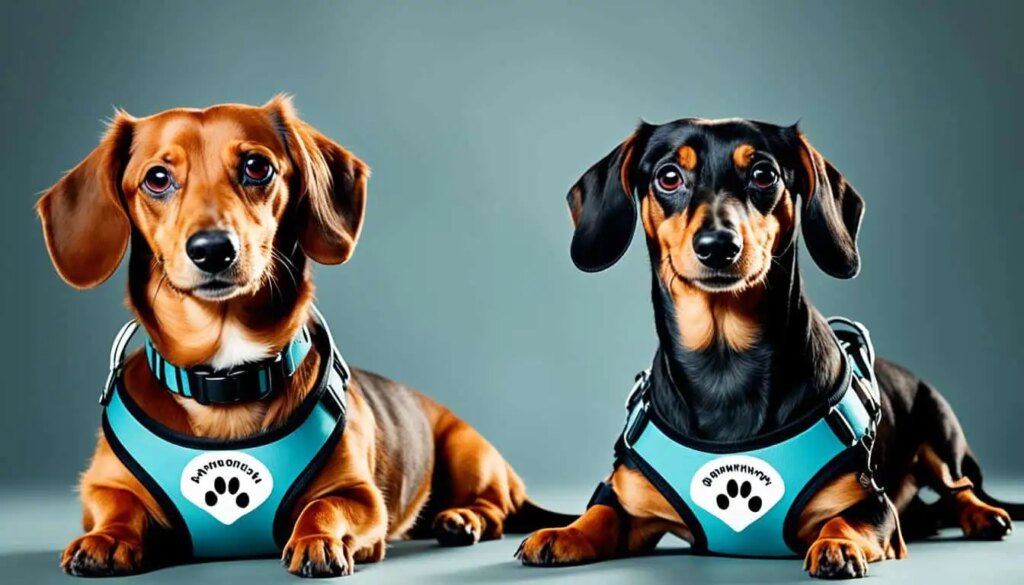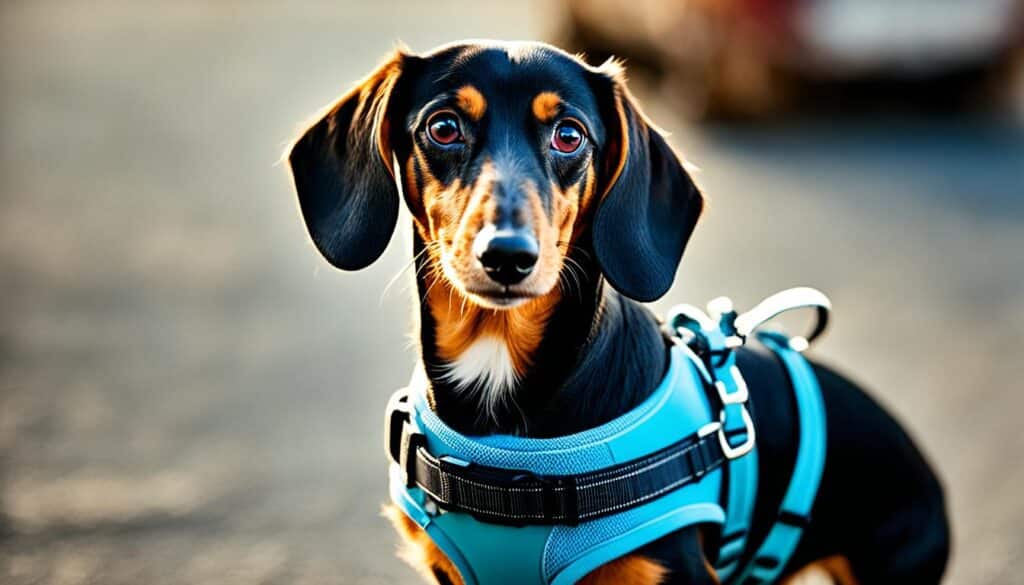As a proud Dachshund owner, I’ve always been concerned about finding the best walking gear for my beloved furry friend. Walking my Dachshund is not only a chance for exercise and fresh air but also an opportunity to bond and explore our surroundings together.
However, I often found myself torn between using a collar or a harness. On one hand, a collar seemed convenient and straightforward, but I couldn’t ignore the potential strain it could put on my Dachshund’s delicate neck. On the other hand, a harness promised better safety and comfort, yet I wondered if it would impede my pup’s movement.
These dilemmas led me to dig deeper and explore the collar versus harness debate for Dachshunds. It became clear that this decision extends beyond personal preference; it directly affects my Dachshund’s neck and back health, safety, and overall well-being.
Key Takeaways:
- Choosing the right walking gear for your Dachshund is crucial for their neck and back health, safety, and comfort.
- The debate between using a collar or harness for Dachshunds is a common concern among owners.
- A collar may be convenient, but it can put pressure on the delicate neck and increase the risk of injury, especially for pullers or during leash corrections.
- A harness distributes pressure evenly across the chest, reducing strain on the neck and is ideal for walking, training, and Dachshunds prone to pulling.
- Consider your Dachshund’s individual needs, behaviors, and preferences when deciding between a collar or a harness.
Understanding Dachshund’s Neck and Back Health
Dachshunds are known for their unique elongated bodies and short legs, which can put them at a higher risk for certain health issues. When it comes to walking gear, it’s crucial to consider their neck and back health to ensure their safety and well-being. In this section, we will explore the specific concerns related to Dachshund neck injuries, the impact of exercise on their muscle tone and spine health, as well as the relevance of Intervertebral Disc Disease (IVDD) in choosing the right walking gear for your Dachshund.
Dachshund Neck Injury Concerns
Dachshunds have delicate necks that are prone to injury, especially when wearing a collar. Collars can put pressure on their necks, particularly during leash corrections or if they tend to pull. This increased pressure can potentially lead to neck strain, muscle tension, and even disc herniation. It’s essential to prioritize their neck health when selecting walking gear to reduce the risk of injury and discomfort.
Impact of Exercise on Muscle Tone and Spine Health
Regular exercise is crucial for maintaining Dachshund’s overall health and well-being. Exercise helps to build muscle tone, improve flexibility, and maintain a healthy weight. When it comes to their spine health, exercise plays a vital role in strengthening the supporting muscles around the vertebrae, reducing the risk of spinal issues. Providing appropriate exercise is essential for preventing back-related problems in Dachshunds.
IVDD in Dachshunds and Walking Gear
Intervertebral Disc Disease (IVDD) is a common condition in Dachshunds, where the discs between the vertebrae degenerate over time, leading to pain, nerve compression, and potential paralysis. IVDD can be exacerbated by certain movements or inappropriate walking gear that puts excessive strain on the spine. Choosing the right walking gear, such as suitable harnesses, can help minimize the risk of injury and support Dachshunds with IVDD in maintaining an active lifestyle.

| Walking Gear | Dachshund Neck Health | Dachshund Back Health |
|---|---|---|
| Collar | Puts pressure on the neck, increasing risk of injury | May strain the back if the dog pulls |
| Harness | Distributes pressure evenly across the chest, reducing strain on the neck | Provides better support for the back, reducing the risk of strain or injury |
Understanding the unique concerns related to Dachshund’s neck and back health is crucial when deciding on the most suitable walking gear for your furry friend. By prioritizing their well-being, you can ensure a safe and comfortable walking experience for both you and your Dachshund.
Is a collar or harness preferable for Dachshunds?
When it comes to choosing the right walking gear for your Dachshund, the debate between a collar and a harness is a common one. While there is no definitive answer, the preference may vary based on your Dachshund’s individual needs and behaviors. It’s crucial to prioritize your dog’s safety and comfort when making this decision.
A collar is a popular choice for many dog owners due to its ease of use and affordability. It’s easy to put on and remove, making it convenient for daily walks. However, it’s important to note that collars can put pressure on your Dachshund’s delicate neck, increasing the risk of injury, especially for pullers or during leash corrections.
On the other hand, a harness distributes pressure evenly across the chest, reducing strain on the neck. This can be beneficial for Dachshunds, particularly those prone to pulling or with neck sensitivity. Harnesses are also a great choice for training purposes, offering greater control and support. However, some harnesses may take longer to put on and remove, and certain designs might restrict movement to some extent.
To visually depict the pros and cons of collars and harnesses for Dachshunds, refer to the table below:
| Collar | Harness |
|---|---|
| Pros | Pros |
| Easy to put on and remove | Distributes pressure evenly across the chest |
| Generally less expensive | Ideal for walking, training, and dogs prone to pulling |
| Cons | Cons |
| Can put pressure on delicate necks, increasing risk of injury | May take longer to put on and remove |
| Some designs might restrict movement |
Remember, every Dachshund is different, so it’s essential to consider their unique needs and preferences. If you’re unsure, consult with your veterinarian or a professional dog trainer who can provide expert guidance on the best walking gear for your Dachshund.

Different Types of Collars and Their Effects on Dachshunds
When it comes to choosing a collar for your Dachshund, there are several types to consider. Each type has its own benefits and potential effects on your furry friend. Let’s explore the different collar options and how they can impact your Dachshund’s comfort and safety.
Standard Collars: Rolled vs Flat
Standard collars, also known as flat collars, are the most common type of collar used for dogs. These collars are made of flat strips of material and typically fasten with a buckle or clip. They are easy to put on and remove, making them convenient for everyday use.
However, it’s important to note that standard collars may put pressure on your Dachshund’s delicate neck. This can increase the risk of neck injuries, especially for dogs that tend to pull on the leash or require leash corrections. With their long bodies and short legs, Dachshunds are already prone to spinal issues, so it’s crucial to consider their neck health when using a standard collar.
Alternatively, rolled collars offer a potential solution. These collars have a rounded shape that reduces the pressure on your Dachshund’s neck. Rolled collars are designed to distribute pressure more evenly, minimizing the risk of injury. If your Dachshund has a sensitive neck or is prone to neck problems, a rolled collar may be a more suitable option.
Martingale Collars and Their Safety Features
Martingale collars, also known as limited slip collars, are popular choices for Dachshunds. These collars consist of a flat section and an additional loop that tightens when the dog pulls or tries to slip out of the collar. The tightening action prevents escape without choking or putting excessive pressure on the dog’s neck.
Martingale collars are especially valuable for Dachshunds that tend to back out of their collars or have slender necks. The safety features of martingale collars provide added security, ensuring that your Dachshund stays safely restrained during walks or outings.
It’s important to note that martingale collars should be properly fitted and adjusted to ensure effectiveness and comfort. Always consult the manufacturer’s guidelines or seek advice from a professional to ensure your Dachshund’s martingale collar is providing the intended benefits.

Assessing Harnesses for Dachshund Safety and Comfort
When it comes to ensuring the safety and comfort of your Dachshund during walks, harnesses are an excellent choice. They provide better control, distribute pressure evenly across the chest, and minimize strain on the neck. Let’s take a closer look at the two main types of harnesses and an additional accessory that can enhance your walking experience.
Front-clip vs Back-clip Harnesses
Front-clip harnesses attach the leash to the front of the dog’s chest. This design helps discourage pulling by redirecting the dog’s forward movement, promoting better walking behavior. Front-clip harnesses are recommended for Dachshunds who tend to pull or those undergoing training to improve their leash manners.
Back-clip harnesses, on the other hand, feature a leash attachment on the back, similar to a traditional collar. These harnesses provide more freedom of movement and are suitable for Dachshunds who are already well-behaved on leash. They are also easier to put on and take off compared to front-clip harnesses.
Ultimately, the choice between front-clip and back-clip harnesses depends on your Dachshund’s behavior and training needs.
Double-ended Leash for Added Control
In addition to choosing the right harness, adding a double-ended leash to your walking gear arsenal can offer even more control during walks. A double-ended leash features two attachment points, allowing you to connect one end to the front of the harness and the other end to the back. This configuration provides additional control over your Dachshund’s movement, making it easier to steer and guide them.
Remember, every Dachshund is different, so it’s essential to consider their safety and comfort when selecting a harness and leash combination. Take into account their behavior, training level, and any specific needs they may have. By choosing the right harness and utilizing the benefits of a double-ended leash, you can ensure enjoyable walks while keeping your Dachshund safe and comfortable.
Pros and Cons: Making an Informed Decision on Walking Gear
When it comes to choosing the right walking gear for your Dachshund, you may find yourself torn between using a collar or a harness. Both options have their advantages and drawbacks, so it’s important to weigh them carefully before making a decision. Let’s explore the pros and cons of each to help you make an informed choice.
Advantages of Using Collars for Dachshunds
Collars are a popular choice for many Dachshund owners due to their simplicity and affordability. Here are the key advantages of using collars:
- Easy to put on and remove, making them convenient for everyday use
- Generally less expensive compared to harnesses
Benefits of Harnesses in Dachshund Walking
While collars have their advantages, harnesses offer unique benefits that can enhance your Dachshund’s walking experience. Consider the following advantages:
- Distributes pressure evenly across the chest, reducing strain on the neck and minimizing the risk of injury
- Ideal for walking and training sessions, providing better control and reducing pulling
- Well-suited for dogs prone to respiratory issues or those with neck or back problems
Addressing the Drawbacks: Collars and Harnesses
It’s important to acknowledge the potential drawbacks of both collars and harnesses. Here’s what you should keep in mind:
Collar Drawbacks:
- Can put pressure on the delicate necks of Dachshunds, increasing the risk of injury
- May not be suitable for dogs that are strong pullers or require leash corrections
Harness Drawbacks:
- May take longer to put on and remove compared to collars
- Some harness designs may restrict movement, depending on the brand and style
By considering the advantages and drawbacks of both collars and harnesses, you can make an informed decision on the best walking gear for your Dachshund. Remember to prioritize your Dachshund’s safety and comfort when making your choice.
| Collars | Harnesses | |
|---|---|---|
| Advantages | Easy to put on and remove | Distributes pressure evenly across the chest |
| Generally less expensive | Ideal for walking and training sessions | |
| Drawbacks | Can put pressure on delicate necks, increasing the risk of injury | May take longer to put on and remove |
| May not be suitable for strong pullers or dogs requiring leash corrections | Some designs may restrict movement |
Conclusion
In conclusion, when choosing the best walking gear for your Dachshund, it is important to consider their individual needs and preferences. Both collars and harnesses have their benefits and drawbacks, and the decision ultimately depends on what works best for your furry friend.
Collars are easy to put on and remove, and they are generally less expensive. However, they can put pressure on the delicate necks of Dachshunds, increasing the risk of injury, especially for pullers or during leash corrections.
On the other hand, harnesses distribute pressure evenly across the chest, reducing strain on the neck. This makes them ideal for walking, training, and dogs prone to pulling. While some harnesses may take longer to put on and remove, and some may restrict movement, they offer a safer and more comfortable option for your Dachshund.
Ultimately, the decision between a collar and a harness depends on your Dachshund’s needs and behavior. It is recommended to consult with your veterinarian or a professional dog trainer to determine the best walking gear for your Dachshund. By taking into account their unique needs, you can ensure their safety and comfort during walks.
